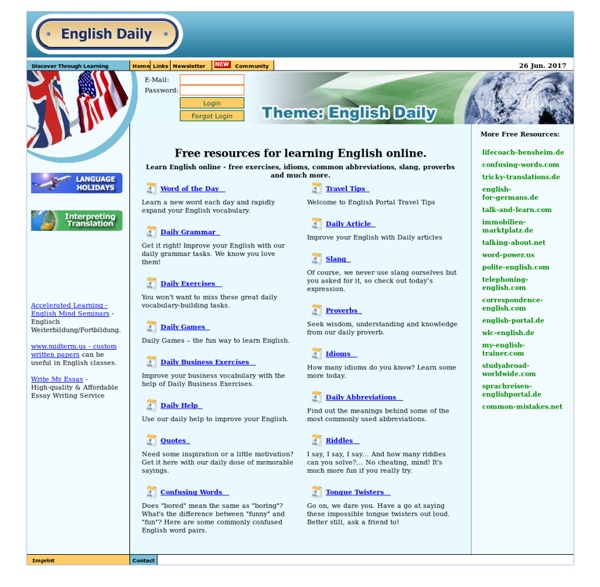



Learning basic English Humans of New York English usage If you're trying to improve your conversational English, you're in the right place. The sections below include a variety of references on everyday English usage from an American English perspective. Whether you need to expand your vocabulary, master some new idioms, or pick a good English name, these pages will serve you well. Vocabulary Building your English vocabulary is an essential part of learning to speak English. Idioms Learning idioms and expressions is one of the fun parts of studying a language. Punctuation Using punctuation marks correctly in your English writing is essential in both academic and professional situations. Quotes These are the quotes that are most familiar to native English speakers. Names These charts of the most common first and last names in English-speaking countries are based on the latest available data. Tongue Twisters Work on your English pronunciation with this list of English tongue twisters of different levels of difficulty, from easy to maddeningly hard.
Advanced Reading Practice Questions Refer to the following passage for questions 1 through 5. In 1892, the Sierra Club was formed. In 1908, an area of coastal redwood trees north of San Francisco was established as Muir Woods National Monument. John Muir was born in 1838 in Scotland. When John was 11 years old, his family moved to the United States and settled in Wisconsin. Muir left home at an early age. When Muir discovered the Yosemite Valley in the Sierra Nevadas, it was as if he had come home. Muir began to write articles about the Yosemite Valley to tell readers about its beauty. Although Muir won many conservation battles, he lost a major one. 1. A. 2. A. 3. A. 4. A. 5. A. Refer to the following passage for questions 6 through 9. When using a metal file, always remember to bear down on the forward stroke only. It is best to bear down just hard enough to keep the file cutting at all times. 6. A. 7. A. 8. A. 9. A. Refer to the following passage for questions 10 through 19. 10. A. 11. A. 1760s. 12. A. 13. 14. A. 15.
Learn Vocabulary and Grammar grammar, vocabulary, conversation Learn English Learn English english-lesson-plan.com Tons of Language Activities English Test-free online practice tests EnglishClub : English language Student - English Grammar, Vocabulary, Reading grammar guide Comprehensive guide to all areas of English grammar. Clear explanations Easy-to-follow examples Simple memorable rules and tips grammar exercises Check your understanding using fun grammar quizzes. Gap fill, multiple choice and matching Each exercises marked and graded Continue to next level when you're ready! test center NEW! Adaptive training and mock tests for IELTS, TOEFL® and TOEIC®. Hundreds of hours of practice. Register Today our android & iOS app the English Learning Lounge Download The English Learning Lounge and give your English learning a boost. The FREE app that doesn't stress you and test you - it explains, then checks. Are you too busy to do a long, expensive English course? The English Learning Lounge is the free English learning app from esl-lounge.com. Android Version ~ Apple Version listening Different dialects of English (UK, US, etc) Variety of exercises: multiple choice, gap-fill, true/false and more Full transcripts available reading newsletter vocabulary games
English Lessons in Brighton -